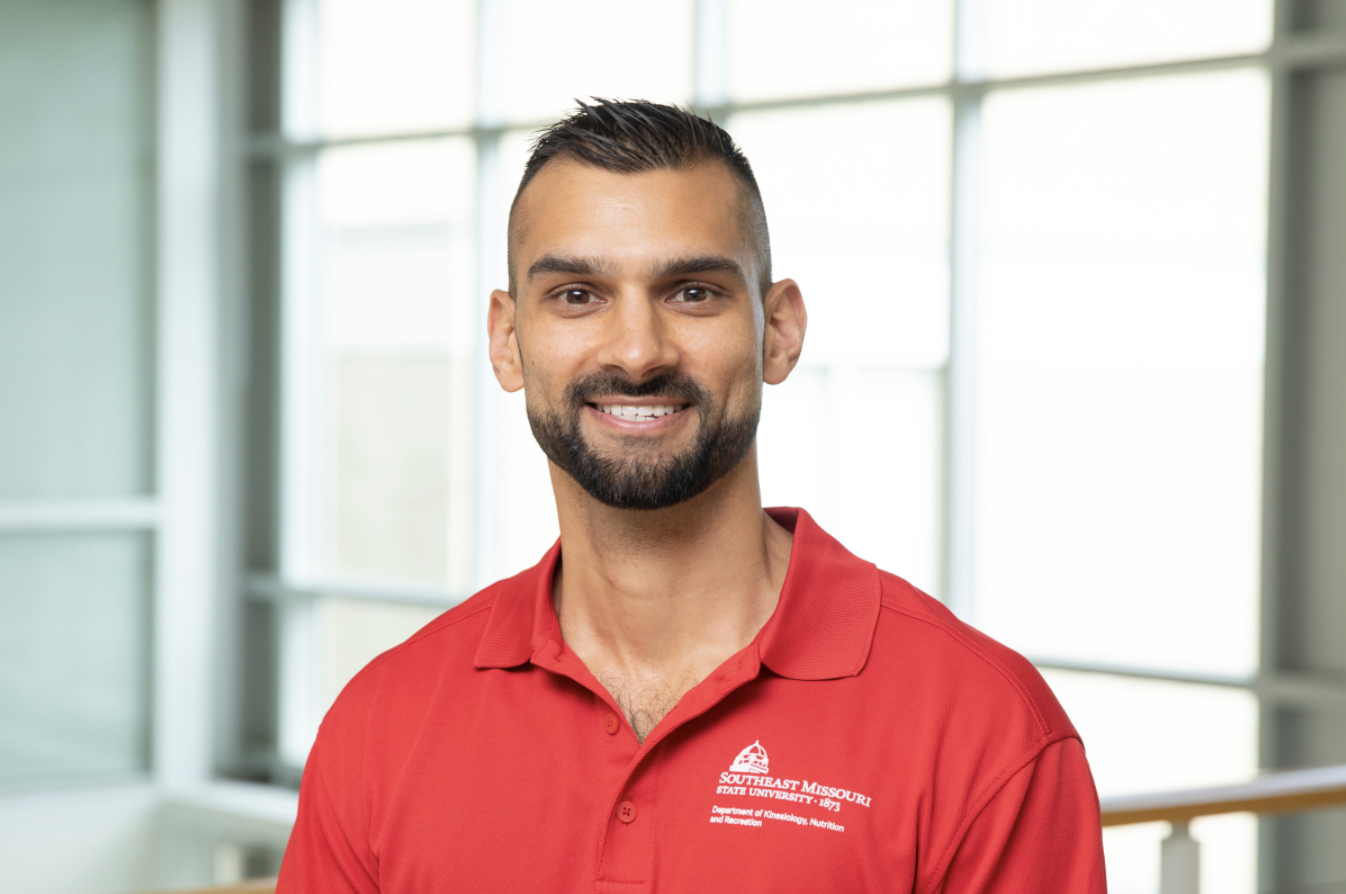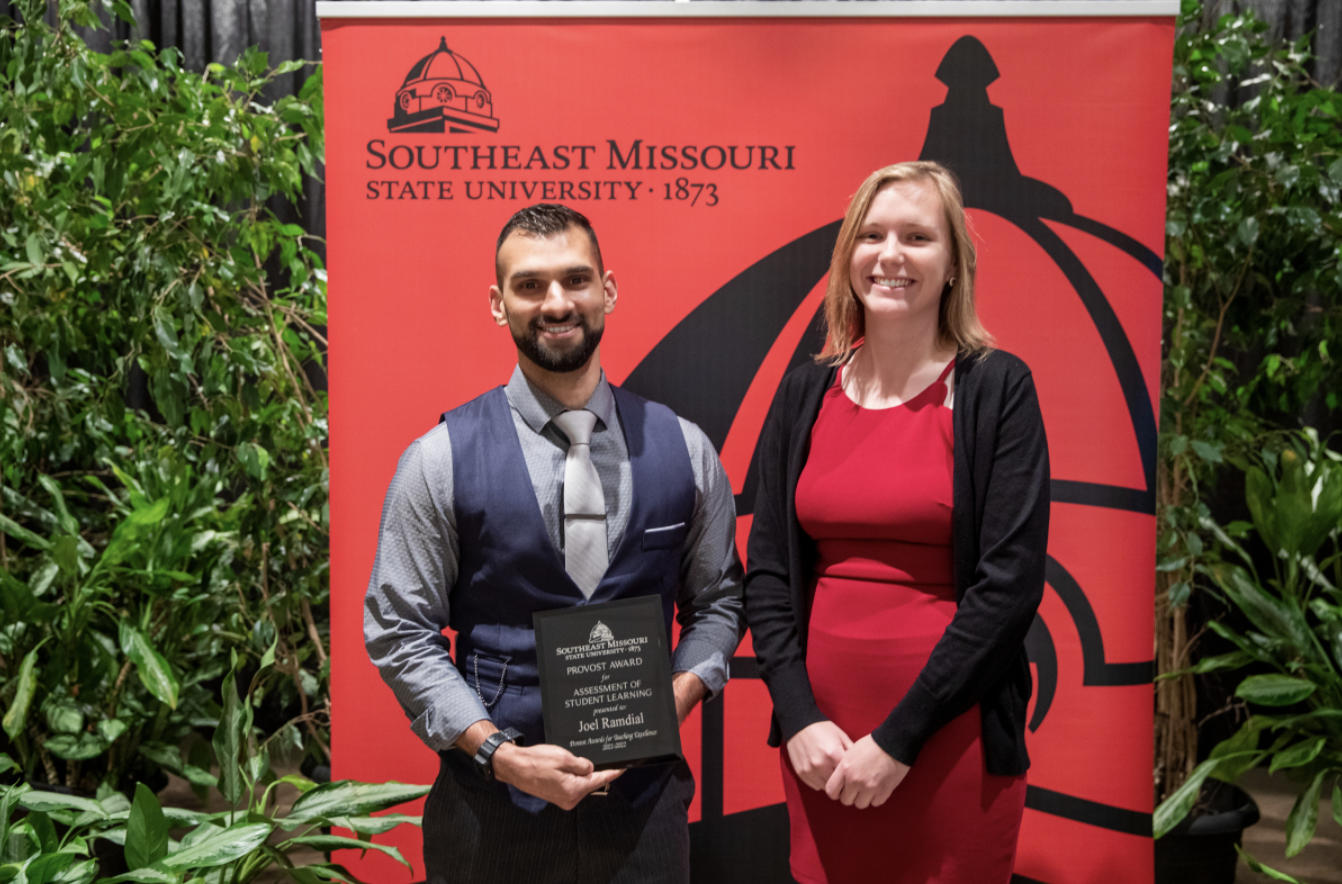What does it take to prepare students for careers in nutrition and dietetics?
Preparing Students to Become Dietetics Professionals: A Conversation with Dr. Joel Ramdial
Continue to main contentFor Dr. Joel Ramdial, instructor and program director for SEMO Online’s Master of Science (MS) in Applied Nutrition program, it takes much more than delivering lectures and grading assignments. It takes providing these future professionals with real-world experience, a rigorous education, personal support and a genuine investment in their success.

In a recent conversation, Ramdial shared insight into his own path into dietetics, the evolution of Southeast Missouri State University’s graduate applied nutrition program and his vision for the future of dietetics professionals trained through SEMO Online.
From Art and Wrestling to Dietetics
As is true for many people, Ramdial’s path to the field of dietetics wasn’t linear. His interest in health and nutrition was initially sparked when he participated in high school wrestling.
“Wrestling is such a weight-conscious sport,” he says. “I had some good habits that I learned from different resources, but I also had some really bad habits. As I was trying to learn, I didn’t have access to or know a dietitian, and I wish I had. I think it would have been very helpful for me.”
Ramdial went on to earn an undergraduate degree in fine arts, specializing in painting. Later, while working as a personal trainer—where questions about food and nutrition naturally arose alongside discussions with his clients about their physical training goals—he crossed paths with one client who was a Registered Dietitian. That relationship helped crystallize his next move.
“I realized I wanted to go back to school, so that I could empower others to build a healthy lifestyle through nutrition and exercise,” he says.
After earning a master’s degree in human environmental studies with an emphasis in dietetics, he became a Registered Dietitian and began teaching at SEMO as an adjunct faculty member. Ramdial became a full-time instructor in 2015 and took on the role of Dietetic Internship (DI) program director in 2017.
Shortly after becoming the DI program director, Ramdial initiated the development of the MS in Applied Nutrition program to meet the pending updated credentialing requirements, which would require anyone taking the credentialing examination for Registered Dietitians to have a master’s degree beginning in 2024. Along with major contributions from SEMO Online and his colleagues, Ramdial led the development of the program, which spanned several years of hard work and culminated in the program officially beginning its first cohort of students in May 2021.
According to Ramdial, this would not have been possible without the contributions of his colleagues, Dr. Charlotte Cervantes, Dr. Lea Anne Lambert and Dr. Amy Moore, and the coordination of SEMO Online. Ramdial highlights the contributions of Cervantes, who is now the director of the Bachelor of Science in Nutrition program at SEMO and teaches in the MS in Applied Nutrition program. She was previously the assistant director for the Dietetic Internship and for the MS in Applied Nutrition program while it was being developed and for the first two cohorts.
“Dr. Cervantes is a great colleague and was instrumental to the collaborative development of the applied nutrition program and many outstanding courses in the program. I am so grateful for her tireless efforts, contributions and support over the years,” Ramdial says.
As the director and an instructor for the applied nutrition master’s degree program, Ramdial teaches classes and provides tailored guidance to students at every stage of the accelerated 15-month program. A total of 62 students have graduated from the first four cohorts, and the 18 students currently in the fifth cohort are on pace to graduate in August 2026.
Ramdial and his colleagues continuously explore and implement strategies to improve the program and keep it thriving in the dynamic field of nutrition and dietetics.
Ramdial is also devoted to continuous improvement in his own experiences and qualifications. He earned his doctorate in educational leadership and policy analysis from the University of Missouri in 2022, which helped him build his program administration and research skills. He served on the executive board of the Missouri Academy of Nutrition and Dietetics (MOAND) for many years, including as the president from 2022 to 2023, and was named Missouri’s outstanding dietitian of the year by MOAND in 2023.
Ramdial recently completed an extensive culinary nutrition training program, and now has his sights set on expanding his knowledge and skills for using artificial intelligence for nutrition and dietetics applications.

MS in Applied Nutrition Program at a Glance
SEMO Online’s Master of Science in Applied Nutrition program is a unique and fast-paced program designed for students who wish to become Registered Dietitians. The program is accredited by the Accreditation Council for Education in Nutrition and Dietetics (ACEND) as a Graduate Program in Nutrition and Dietetics.
The program is built around a cohort model—students enter together, grow together and graduate together over an intensive 15-month period. That continuity, Ramdial believes, is key to fostering a sense of community and professional identity in a fast-paced, online educational setting.
Coursework is conducted completely online. Students also complete 1,000 hours of in-person supervised experiential learning (SEL) rotations, as well as an integrated capstone research project. While field experiences must be completed in person, students can schedule their SEL to occur anywhere in the United States under the supervision of a qualified preceptor through SEMO’s remote distance option.
Graduates of the program receive a verification statement that allows them to apply to take the Registration Examination for Dietitians (RD exam). After passing the RD exam, graduates can gain state licensure and become Registered Dietitians (RDs) or Registered Dietitian Nutritionists (RDNs).
The Role of Supervised Experiential Learning
Through SEL, students rotate through real-world nutrition settings, guided by preceptors who mentor them through hands-on practice.
“Their assignments are coordinated directly with what they’re doing at their rotation sites,” Ramdial says.
Perhaps the most powerful part of SEMO Online’s applied nutrition program is how closely it ties students to the communities they serve. It’s not uncommon for student projects developed during rotations to be implemented permanently, giving students not only experience but also a tangible legacy. Many are also hired by the same organizations where they completed their rotations.
“Every site they’re at is a potential future job, and we always tell them to consider it one big interview,” says Ramdial.
Ramdial regularly visits the field placement sites and has virtual meetings with preceptors. His favorite administrative experience is visiting local hospitals such as Mercy Southeast, where SEMO alumni now serve as preceptors to current students in the program. He describes the pride he feels when he sees professionals who once sat in his classroom now guiding the next generation.
“They’re all great dietitians,” says Ramdial. “It’s wonderful to walk into their office and see just so many students that have come through our program. That’s the most rewarding part, to see the whole process come full circle like that.”
What Makes SEMO Online Different?
Why do students choose SEMO Online’s program over other programs? According to Ramdial, the answer lies in its unique balance.
“I think our program does a great job of having a balance between a very quick timeline towards taking the exam, while also allowing some flexibility and customizability within projects and courses...It’s a pretty rare combination for students to be able to get both of those experiences simultaneously,” he says.
Where some accelerated programs offer a one-size-fits-all model, SEMO Online’s program builds in opportunities for students to pursue their interests. Every student completes an independent research project—something many dietetics programs skip.
“If you like a fast pace, want to get it done, and just want to work hard and get through it, this is a great fit,” he says. “And especially if you want to conduct your own research at the same time, which I think is pretty key to the graduate student experience.”
Support From Day One: Research, Mentorship, and Career Prep
The research journey begins early at SEMO Online. In their first summer, students select a topic from a list curated by faculty, are paired with mentors and begin building out their project ideas. From there, they move through a structured timeline: methodology in the fall, data collection in the spring and final write-up and presentation in the summer.
And when it’s time to think beyond school, SEMO doesn’t leave students hanging. Ramdial notes that the program devotes considerable time and resources to helping students prepare for their future careers.
About 75 percent of the program’s final course is dedicated to RD exam preparation, using a robust test-prep platform funded by program fees.
“Students also learn about how to acquire and maintain their licensure, get their RD exam credentials and do continuing education. They explore entrepreneurial opportunities, and they’re required to look for jobs and write an updated resume as well,” he explains.
Open to Curious Students, Not Just Nutrition Majors
Another compelling feature of SEMO Online’s applied nutrition program is its accessibility; it is not just for students with an undergraduate degree in dietetics. In fact, many current students are career-changers looking for a new path in health and nutrition, just as Ramdial once was.
Applicants without an undergraduate degree in nutrition can still qualify for the graduate program by first completing certain foundational courses. Those prerequisites can be taken online through SEMO or locally. For some students, alternative low-cost options that allow them to build the necessary background may also be accepted.
Thinking About Applying? Start Early and Be Adaptable
Ramdial’s top advice for prospective students? Start the application process early. The program uses the Dietetics Inclusive Centralized Application Services (DICAS) application portal, which can be challenging for students coming from nondietetics backgrounds.
“There’s a learning curve to it,” he says. “So I always encourage people to reach out for help.”
Ramdial also wants future applicants to know that, while the program is fast and intense, students who are ready to work hard and remain open-minded will thrive.
“Graduate school is demanding. It requires a lot of flexibility,” he says. “There are lots of things that fall outside of students’ control in those rotations, because they’re going somewhere else to learn from another person who has a job and is used to their routine. So it’s important for students to go in with an open mind to learn and work hard, that’s really the key.”
From Student to Leader: Start Your Career in Nutrition and Dietetics Today
Joel Ramdial, program director for the Master of Science in Applied Nutrition program at Southeast Missouri State University, is not just teaching nutrition, he’s helping to shape the future of the field, one student at a time.
If you’re ready to make a real difference in your career and your community, enrolling in SEMO Online’s Master of Science in Applied Nutrition program might just be the right next step for you. Channel your interest into an impactful career. Discover how SEMO Online can prepare you for a rewarding future in nutrition and dietetics.
Recommended Readings
What Can You Do with a Nutrition Degree?
A Passion for Nutrition: Sammy Biermann’s Student Journey
STEM vs. Humanities: Choosing Your Degree Path
Resources
Commission on Dietetic Registration, 2024 Graduate Degree Requirement — Registration Eligibility
Dietetics Inclusive Centralized Application Service, DICAS Applicant Help Center
Southeast Missouri State University, MS Applied Nutrition Applicant Handbook